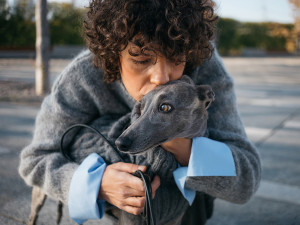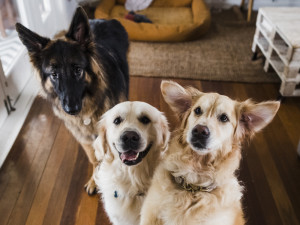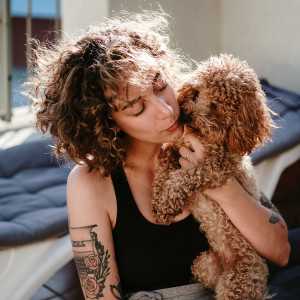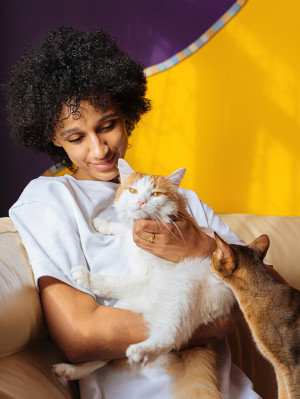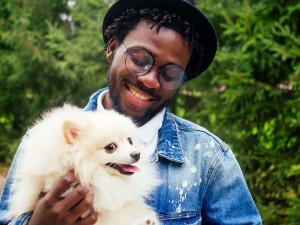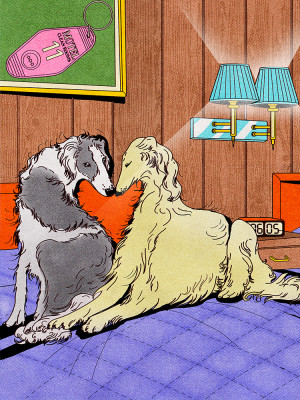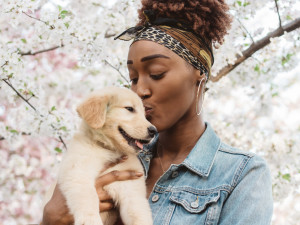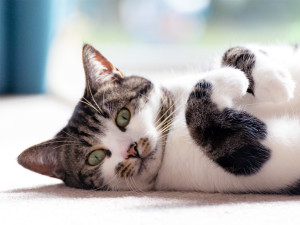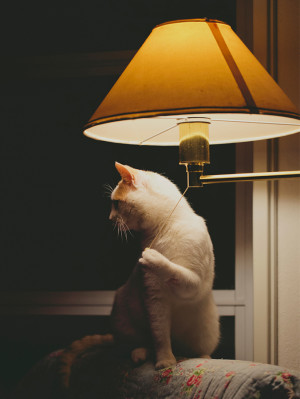How Anthropomorphisation Makes You a Better Pet Parent
What are the benefits of our pets’ human personalities? Psychotherapists and animal behaviourists weigh in
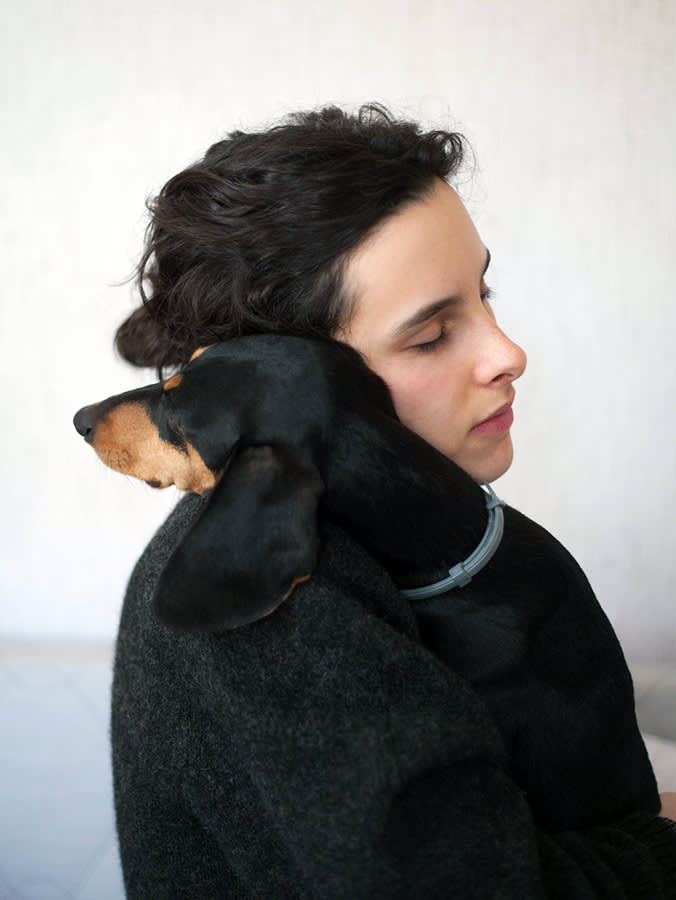
Share Article
As pet parents, we’re all uniquely attuned to our dogs’ and cats’ personalitiesopens in a new tab, quirks and behaviours. No two animals are the same, and your pet is the absolute best of the bunch, right? When your pup snuggles up to you after you’ve had a totally rubbish day, you know it’s because they love and care about you; even your usually aloof cat will show how much they missed you by rubbing up against your legs when you get home (it’s definitely not because dinner is five minutes late).
Animals are just like humans in many ways, and while some of the emotions we attribute to them might not be exactly correct (does your dog really have a crush on Jacob Elordi or is that projection), we all anthropomorphise our pets to an extent, and this is for very good reason. We discover more about this universal human trait to find out what’s really going on.

Get (totally free) deals for food, treats, accessories, tech and way more pet parenting must-haves.
opens in a new tabWhy do we anthropomorphise animals?
Anthropomorphism is an innate part of human psychologyopens in a new tab, and we have anthropomorphised animals for thousands of years. Aesop’s fablesopens in a new tab, from the late to mid-6th century BCE, are renowned for using animals to represent human traits and impart life lessons. Remember The Tortoise and The Hare? The tortoise embodies the human qualities of confidence, strength and patience (major goals). Zoologist and author Jo Wimpenny, who wrote a book on whether there is any scientific truth to Aesop’s portrayal of the animal kingdom (Aesop’s Animals: The Science Behind The Fablesopens in a new tab), explainsopens in a new tab that Aesop used “particular animals to show particular human traits: the snake is treacherous, the sheep is obedient, the owl is wise, and so on.”
As children, we tend to give human personalities to our teddies and toys, too, which can be an instant way of connecting with themopens in a new tab, and giving and receiving love. And when we welcome our first pet into our homes, whether that’s as a child or an adult, we have a best friend in our lives that’s full of personality, who we can connect with on an even deeper level (sorry teddies, the real-life dog is far better).
What are the benefits to humans of anthropomorphising our pets?
Emily Whitehouse, a certified dog trainer and expert behaviourist, gives us her take on this natural human instinct. “At the heart of pet ownership is companionship,” she says. “Pets share our lives with us, they see the ups and the downs we go through and sit beside us offering unconditional comfort and loveopens in a new tab. I believe we anthropomorphise our pets to help close the gap between our species, so that we feel even more understood, and can be there for our pets just as much as they’re there for us.”
Our pets play an increasingly important role in our lives by giving us love; they create a human-animal bond that is similar to being loved by our family members (and in many cases, this is a lot less complicated). But even if you’re lucky enough to have the most loving parents or partner in the world, they’re human, and therefore they come with human traits of judgement, opinion and unsolicited advice. Your dog or cat will never raise an eyebrow as you tell them that you unblocked and messaged that toxic ex who should have stayed in the past; they won’t ask if you’ve tried meditation when you complain about being stressed from work; they’ll listen to all your problems and still love you unconditionally.
“Animals can’t lie,” says Sarah Urwin, a counsellor and psychotherapist who offers animal and equine assisted therapy. “They can’t separate how they feel from how they act, which as humans, we do all the time. We might see someone hugging someone else saying, ‘How lovely to see you!’ but their body is actually saying, ‘Get away from me’. Animals can’t do that – they are genuine. What you see is what you get.”
Also, as Sarah points out, the response we receive from animals is what one of the eminent founders of human psychology, Carl Rogers, deems essentialopens in a new tab from a fully-present human therapist: empathy, congruence and unconditional positive regard. Some people, therefore, actually feel safer, less defensive and more accepted around animals.
Can anthropomorphism help make us better pet parents?
Feline behaviourist and author Lucy Hoile says that “anthropomorphism is a good thing”. She goes on to explain: “It can help us empathise with cats especially, which is massively lacking. People get a cat and think they’re independent, low maintenance and that they don’t need much, whereas being able to empathise helps us to understand that they (cats) do experience emotions, and have additional needs and anxietiesopens in a new tab.”
Having empathy for our pets is hugely important when it comes to showing up as our best pet parent selves. “We often strive to understand why our pets are behaving in certain ways. So by thinking of them in human terms, it can help us come to logical conclusions,” says Lucy. “For instance, realising that they’re not cross at you, and instead they may actually be anxious.”
Lucy says it’s good to have that understanding when, for example, you set up your cat’s environment. If a client’s cat seems off its foodopens in a new tab, Lucy might explain not to have the food bowls next to the litter trayopens in a new tab by asking them, ‘Well, would you like to eat your food next to your loo?’ So an easy way to improve our own behaviour towards our pets is to ask ourselves, ‘How would I feel if it was me?’
Emily agrees: “I think there are many benefits of anthropomorphism. Our pets are kept safe, in good conditions, and are warm and well looked after. They receive affection and enrichment that can really improve their quality of life. Nothing beats seeing your pet happy and fulfilled.”
Are there any downsides to anthropomorphism?
We love our pets like they’re our family, but is it possible to go too far? “Just like raising children, pets need structure in their day to day as well as affection. It’s completely normal to see your pet as a family member and love them as such,” says Emily. “However, remember to respect that they’re animals who cannot keep up with all our vocabulary – they can often feel confused. Rules, boundaries and training help our pets co-exist healthily and happily. When we not only understand but celebrate the differences between our species, we most often see the relationships with our pets deepen.”

Fanny Johnstone
Fanny Johnstone is a lifestyle journalist for national broadsheets and magazines, a copywriter and painter. She lives on remote Cornish cliffs with her family. In between occasional escapes to London, and worrying about how to save wildlife, she is also manager of the family’s dog and cat partnership, soon to be appearing as The Foxy & Pussca Show.
Related articles
![Man hugging his fluffy white dog happily]() opens in a new tab
opens in a new tabChemistry Between People and Pets Is Real (It’s Science)
How the ‘love hormone’ oxytocin connects us with our pups
![An illustration of 2 dogs on a bed]() opens in a new tab
opens in a new tabThree’s a Crowd: When One Partner Doesn’t Want the Dog in the Bed
You want them to cuddle up; your partner doesn’t. Here’s how to handle the great bed debate
![3 dogs posed together in a house]() opens in a new tab
opens in a new tabDoes Your Dog Have a Unique Personality?
Research says your dog is as special and perfect as you tell them they are
![woman draped in an orange blanket holds a black-and-white puppy]() opens in a new tab
opens in a new tabPuppy Developmental Stages and Milestones
What to Expect When You’re Expecting – canine edition
![tri-colour, calico cat, white, black and tabby cat lying on their back with their paws lifted, looking at the camera]() opens in a new tab
opens in a new tab10 Common Cat Myths (That Are Actually False)
Peel back the layers of mystery to discover the truth about our feline friends
![White cat switching on lamp on couch]() opens in a new tab
opens in a new tabWhy Does Your Cat Wake You Up at Night?
You want to sleep, your cat wants to party. Here’s how to deal with it
